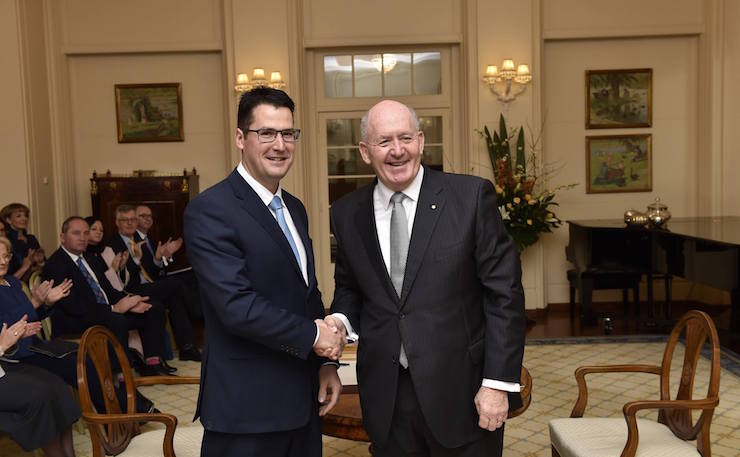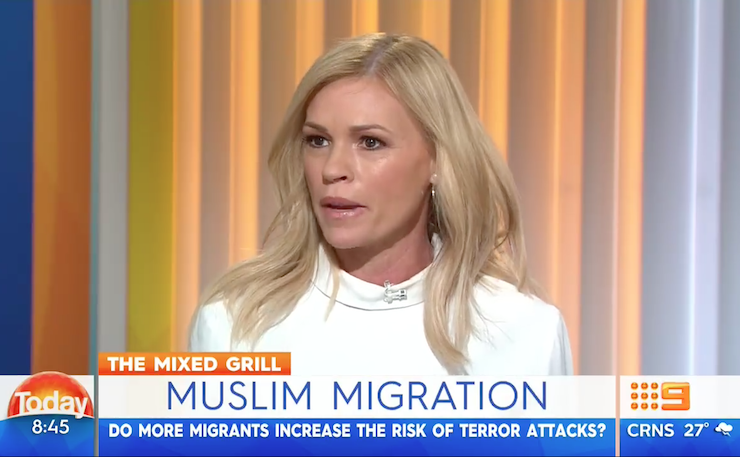Aggression and anger are not the same thing. When faced with open calls for discrimination, the latter is part of a healthy response, writes Lydia Shelly.
Forgiveness can be a powerful step towards healing. One of the moral principles recommended in Islam’s Holy Book, the Quran, is forgiveness: “…But if you pardon and exonerate and forgive, God is Ever-Forgiving, Most Merciful” [Quran 64: 14].
Waleed Aly’s recent comments regarding Sonia Kruger’s calls for the halt of migration based on faith sought to #sendforgivenessviral and warned against the “destructive” cycle of outrage and anger. Kruger has not apologised for the hurt caused to not only the Australian Muslim community, but all those who stand against hate, as well as those who use it to foster division within our country
In fact, the day after calling for a halt on “Muslim migration” based on her “fear”, Kruger was afforded a second primetime slot on the Today Show to issue a tear stained justification for her comments. The Nine Network issued a statement of support.
Aly’s comments then take on significance: Australian Muslims were being asked to pre-emptively forgive for the extreme views spruiked by Kruger and sanctioned by the powerful institutions of network television.
The significance of having Aly framing forgiveness as the only appropriate response to Kruger’s nationally broadcast call to alter our border security policies based on hate is that it unwittingly contributes to the normalisation of the sentiments behind Kruger’s views.

The Assistant Minister for Multicultural Affairs, Mr Zed Seselja said in response to Kruger that: “…I understand there are, people do feel unease about events overseas and some of the events we’ve seen in Australia. So we can’t pretend people don’t feel that fear”. Essentially stating that it is entirely reasonable for Kruger to be fearful. Again, the message that Kruger was frightened explained her hate speech. Not only is this offensive to women generally as it reinforces the notion that our ovaries effect our decision making process, it also suggests that in times of uncertainty, policy and practices that would otherwise be outrageous are discussed as being reasonable and prudent measures to safeguard security.
Kruger and Aly are both actors within the increasingly popular “respectability politics” that serves to cloak those who benefit from leveraging institutional power against marginalised communities. They are both mouthpieces of a broader narrative which dominates the Australian political and cultural landscape: Australian Muslims are regulated to permissive means of “protesting” against hate, or placed into the ‘Angry Muslim’ stereotype. This is a stereotype which, at its core, assumes Muslims are inherently violent and that anger is one step away from the dormant aggression that lies within us.
As an Australian Muslim Woman, I am expected to protest passively: wearing a ribbon on my blazer, offering cups of tea and luncheons with those who preach hate against me, whispering quietly in private spaces. In essence, I am allowed to protest as long as I do not offend those who peddle the erroneous and toxic narratives and discourses which affect me the most. Australian Muslim women risk not only falling into the Angry Muslim stereotype, but often have the substances of their legitimate grievances discounted because of their physical appearance. The temptation to resort to safe modes of protest are great – we are keenly aware that our mere presence in public spaces often invokes fear. The hijab takes on not just spiritual significance, but an added element of political rebellion.
This is why I was so bitterly disappointed with Aly’s remarks. Anger and outrage is a natural response to injustice. There is nothing wrong with being angry over a network supporting a personality in espousing deeply hurtful and hate based comments. Anger is not necessarily destructive. It can be as constructive as forgiveness. Placating Australian Muslims with a hashtag is also deeply patronising. Anger can be channelled into further engagement with the political, cultural, and economic structures, which can contribute to real social change. Many international and domestic movements have harnessed anger in responding to social injustice and the structures that support injustice.
Kruger is currently the spokesperson for Target, Porsche and Swisse, among other brands. These three companies are reconsidering her relationship with their brands. Hashtag politics may look pretty on Twitter, but I would much rather raise my concerns with those with real power.
As an Australian Muslim Woman, I do not appreciate Aly dismissing my legitimate anger, nor the manner in which I choose to use my voice to combat hate, how much space I take up when I do so, or how I use my voice. Being asked to pre-emptively forgive undermines my agency and implies that, should I choose to withhold forgiveness (at least until an apology is issued), then I am unreasonable. That I am irrational. The conflation between irrationality and anger has long been used to silence women, the most recent example being when Steve Price called Van Badham “hysterical” on Q&A.
I am also conscious that as a privileged Muslim, the opportunities and platform I have to contribute to narratives and discourses are very different to the opportunities and platform afforded to Muslims who are less privileged. Pre-emptive forgiveness has as much do with class as it does with respectability politics.
Tellingly, there has been no conversations regarding the existing opportunities for Australian Muslims, particularly those who are not privileged, to participate in national discourse and the representations of Muslims in the media. The OECD Development Centre defines a cohesive society as one which “works towards the well-being of all its members, fights exclusion and marginalisation, creates a sense of belonging, promotes trust, and offers its members the opportunity of upward social mobility.” I question whether preemptive forgiveness and tweeting will meaningfully contribute to social cohesion. Silence has replaced any conversation about how comments such as Kruger’s undermines social cohesion.
The calls for forgiveness also assumes that the vast majority of Australian Muslims do not exercise forgiveness during their everyday lives when dealing with micro aggressions and daily incidents marred by prejudice, the threat of violence or in some circumstances real violence. Visibly Australian Muslim women are often the lightning rods for hate when they interact in public spaces. Often, mainstream media coupled with the individual and collective experiences of Australian Muslim women when they engage in public spaces acts as a gauge of safety. That is, it informs our decisions including the extent to which one can interact in public spaces, how you carry yourself in public, the exercise of your agency, and even whether your children should attend school.
Your face often hurts from smiling and you are conscious of the clothes you wear in public. Navigating the consequences of hate is exhausting and requires constant reflection of the current national and international discourse. We are keenly aware that our safety depends on our ability to be successful navigators. We do not have the luxury of distancing ourselves.
The issue isn’t whether Australian Muslims have the capacity for forgiveness; the real question is whether those who provide a platform for hate are willing to first apologise.
You can contact Porsche Australia here, Swisse vitamins here, and Target here.
Donate To New Matilda
New Matilda is a small, independent media outlet. We survive through reader contributions, and never losing a lawsuit. If you got something from this article, giving something back helps us to continue speaking truth to power. Every little bit counts.





